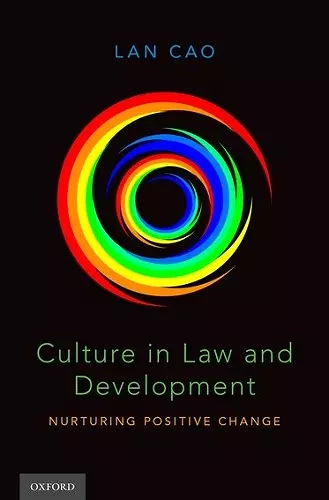Culture in Law and Development
Nurturing Positive Change
Format:Hardback
Publisher:Oxford University Press Inc
Published:23rd Jun '16
Currently unavailable, and unfortunately no date known when it will be back

The growth of international law in the post-World War II era stemmed partly from the belief that universal norms would make life for the entire world's population safer, more equitable, and more conducive to each person's acquisition of basic material needs. Starting in the sixties and seventies, some scholars and activists challenged this assumption and established the school of "cultural relativism," a model that pays deference to local cultural traditions and favors them over international human rights norms. Scholars tried to create and practice a middle-ground approach between universalism and relativism, whereby the most egregious violations would be prevented through assimilating only jus cogens norms into indigenous groups' existing cultural traditions. Such efforts at combining a few select international norms with local cultural traditions largely failed. Culture in Law and Development presents a provocative new solution to the seemingly intractable problem of combining international norms with local cultural traditions by changing culture through law and development. In this book, Lan Cao demonstrates how the gradual expansion of customary international law (CIL) provides a model for changing culture in ways that protect and advance local populations. The book adopts a holistic view of development and argues that cultural norms that impede the human capabilities of the poor, women, and other marginal groups should be changed. The book reveals how a more conscious, coordinated effort on such change can succeed while non-violative local traditions are otherwise honored and preserved. Cao proposes that cultural change does not have to constitute cultural disrespect, and that local societies only benefit by a careful combination of externally wrought change and internally fostered tradition.
Culture matters enormously in shaping the outcome of development and rule of law-building programs. The challenge is appreciating not only the strength of deeply rooted cultural practices but also the empowering possibilities for change. Professor Lan Cao tackles these issues forthrightly, emphasizing that the potential for progressive change exists in dynamic ways in different cultures and should be nurtured conscientiously in partnership with domestic reformers, particularly when equality and human dignity are at stake. Advancing a robust notion of development, Cao argues that cultural norms that "marginalize the poor or subordinate women" - contrary to "universal values" of "human freedom and human capability" - should be changed. This can and should be done respectfully together with local reformers who know their culture best and are working for progressive change from within. * Jane Stromseth, Georgetown University Law Center, American Journal of International Law *
Culture in Law and Development is a pioneering book that systematically shows how culture has been neglected - at significant cost - in a range of separate but interrelated fields, from public international law to international human rights to international relations to law and development. Although almost everyone acknowledges that 'culture is important,' few scholars are willing to engage the thorny issues raised by culture - for example, what should we do when local cultures are antithetical to international development norms? In this fascinating and provocative book, Professor Lan Cao takes on this challenge, arguing that culture can be changed, should be changed, and has been changed before." Amy Chua, John M. Duff, Jr. Professor of Law, Yale Law School
ISBN: 9780199915231
Dimensions: 239mm x 155mm x 36mm
Weight: 898g
546 pages